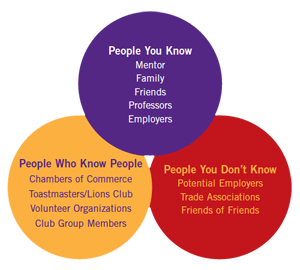Professional and Social Networking
Experience has shown that informal networking and contact development meetings are a rich source of job leads and information about unpublished job opportunities. Successful networking both traditional and online requires that you have as many meetings as possible to tell your story to as many individuals as possible, so that they realize you are in the job market. Career Days, UE alumni or Rotary mentoring programs, campus professional organizations, career recruiting activities, and special events are excellent ways to meet career professionals and build your network. Family and friends also may be a rich resource of professional contacts.
LinkedIn is a business-oriented social networking site used mainly for professional networking. With over 160 million users and expanded features, it is a powerful tool. LinkedIn allows users to research employee profile information and companies they may be interested in working with.
Reasons to Network
- Meet professionals who work in your career field.
- Gain the maximum amount of exposure.
- Get information about target industries or companies, actual job openings, or employment trends.
- Develop rapport with prospective employers.
- Obtain additional names to enlarge your network.
- Establish new, beneficial connections.
How to Contact Persons in Your Network
By telephone
When calling to schedule an appointment, three points should be covered:
- Offer a personal introduction.
- Identify your purpose for seeking an appointment.
- Arrange a mutually convenient time.
Telephone tips
- Write an outline or script of what you are going to say on the telephone. This will decrease your anxiety and ensure that you will cover all the necessary information. Additionally, you will be perceived as organized and professional.
- If you have problems getting “past the secretary,” call before 9:00 a.m. or after 6:00 p.m. Chances are, the individual you are trying to reach may be answering his or her own telephone.
- If you call as a result of a referral, state that person’s name early in the conversation.
- Indicate that you need only 20 to 30 minutes of the person’s time – make sure you adhere to this time limit.
- Express the desire for a personal interview as opposed to a telephone conversation.
By letter or email
As with telephoning for an interview, a letter or email requesting an appointment should include a personal introduction and state the purpose for seeking the appointment.
Writing tips
- Type all letters in business format and double check for correct grammar and spelling.
- Always indicate in the concluding paragraph that you will be calling the office on a specific date (usually one week after you mail the letter) to arrange for a convenient appointment time – make sure you adhere to this schedule.
- Maintain an organized file of all letters and keep a contact list of the outcomes of your efforts.
| Fundamental networking techniques | |
|---|---|
| Ask for additional referrals. | Send thank-you notes, messages, or letters. |
| Develop a tracking system. | Implement a follow-up system. |
| Know your contacts. | Be courteous and demonstrate tact. |
| Utilize faculty members, alumni, family, and friends. | Have a résumé ready; ask for feedback. |
| Attend professional conferences and meetings. | Develop a basic business card. |
| Know your product (you!) - Basic marketing concepts | |
|---|---|
| Be fluent with your 30-second oral résumé. | Know your market. |
| Focus on the value you bring to an employer. | Understand the customer (the employer). |
| Create and foster a unique brand. | Work on your packaging (dress like a professional). |
| Help your references prepare to help you. | Let your résumé set the table for your interview. |
Cultivating Your Network to Find the Hidden Job Market
Statistics show that 80 percent of new jobs are never advertised.* Networking is a necessary skill in order to access the hidden market.
- Your network can include everyone.
- Your network should include 20 to 30 highly targeted, selective, and resourceful individuals.
- Networks often reflect six degrees of separation and overlap with one another; therefore, use the utmost care and professionalism in cultivating them.
- Use new, professional, and social media to implement a web-based networking strategy.
For an individualized and comprehensive job search plan, contact the career development staff today to schedule an appointment.
*Frieson, William, (2012 July, 11) Cracking Hidden JOB Market Retrieved from www.collegerecruiter.com/blog/2011/11/10/cracking-hidden-job-market/ (November 10, 2011)
Additional Information
-
Points to Ponder about Facebook, MySpace and Online Behavior
Ten points to keep in mind when you use Facebook, or MySpace, or other online communities. -
Preparing for Employer Networking Events
Make the most out of an Employment Open House. -
Social Networking Talking Points
LinkedIn, Facebook, Twitter, and Google...Strategies to Leverage Social Media and online networking in your job search -
Professional Image Self Audit
Download and fill out our Professional Image Self Audit form -
Get Started with LinkedIn
Join the online social network, LinkedIn
Office Phone
812-488-1083
Office Email
career@evansville.edu
Office Location
Room 234, Ridgway University Center

